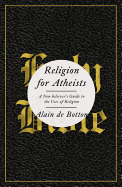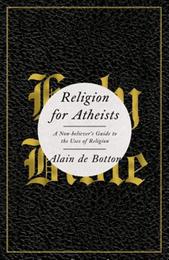
 Alain de Botton (How Proust Can Change Your Life) has written another provocative consideration of one of life's conundrums: the significance of religion in the lives of nonbelievers. "This is a book for people who are unable to believe in miracles, spirits or tales of burning shrubbery," he says on the first page of Religion for Atheists, and then proceeds to extol the wisdom of religions, if not their doctrines, focusing on eight significant areas where religion has a great deal to offer nonbelievers: community, kindness, education, tenderness, pessimism, perspective, art and architecture.
Alain de Botton (How Proust Can Change Your Life) has written another provocative consideration of one of life's conundrums: the significance of religion in the lives of nonbelievers. "This is a book for people who are unable to believe in miracles, spirits or tales of burning shrubbery," he says on the first page of Religion for Atheists, and then proceeds to extol the wisdom of religions, if not their doctrines, focusing on eight significant areas where religion has a great deal to offer nonbelievers: community, kindness, education, tenderness, pessimism, perspective, art and architecture.
"Religions seem to know a great deal about our loneliness," de Botton says of community; in decrying our alienation from one another, he suggests there may well be great benefit derived from a communal meal, citing the Catholic Mass as a symbolic example. Additionally, he claims, the Jewish Day of Atonement (Yom Kippur) is "one of the most psychologically effective mechanisms ever devised for the resolution of social conflict." He is buoyed by the fact that most religious rituals (save funerals) are cheerful occasions tailored to enhance community. Christianity also offers an antidote to pessimism by setting its sights faithfully and firmly on the life to come, he tells us. No matter what this vale of tears might visit upon us, we may still be consoled by that hope and confidence.
De Botton's section on education is particularly salient: "Religions understand the value of training our minds with the same rigour that we are accustomed to applying only to the training of our bodies," he writes. He cites the Zen Buddhist tea ceremony as "one of its most significant pedagogic moments," as important to Buddhists as the Mass is to Catholics. He also notes that all major faiths encourage religious retreats as a way to create a space where people may go away from ordinary life and find "inner restoration," in contrast to the secular world's spas, replete with hot-tubbing couples, plush robes, toiletries made from aromatic herbs and other forms of emphasis on the physical rather than the spiritual.
In this way, de Botton, an unrepentant atheist, goes through his eight categories of human behavior and endeavor. His approach, entertaining and enlightening, provides the thoughtful reader with endless enjoyment and an insight into de Botton's beliefs as well as his generous appraisal of the beliefs of others. --Valerie Ryan
Shelf Talker: A confirmed atheist brings insight and understanding to how religion may enhance the lives of nonbelievers.

